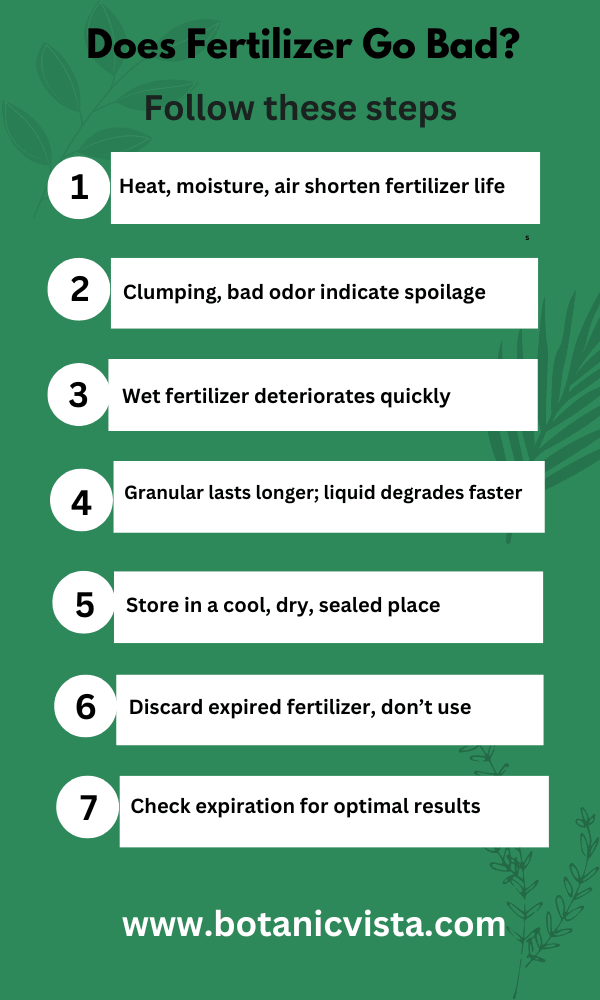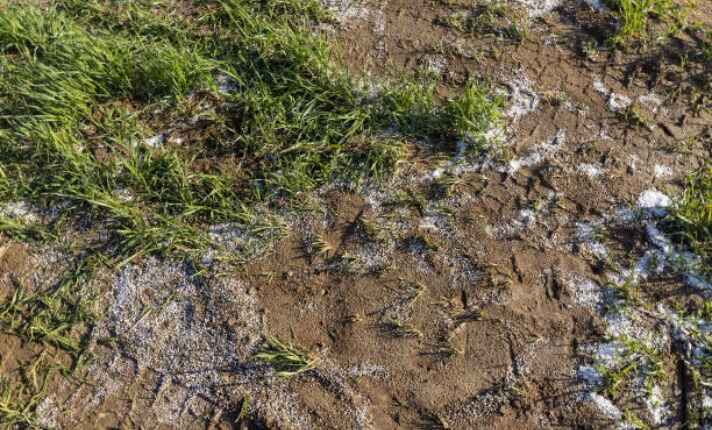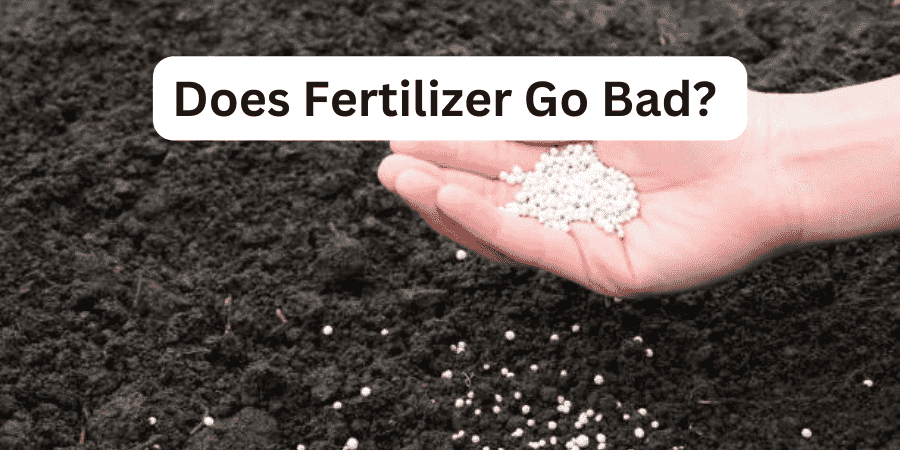Last Updated on October 14, 2024 by Jocelyn
As a gardener, you might wonder if your fertilizer can go bad. The answer is yes, but it depends on how you store it. Fertilizer can lose its effectiveness over time, especially if it’s not stored properly.
When fertilizer is exposed to sun, rain, or extreme temperature changes, it can break down. This affects the nutrients and stability of the product. Keeping it in a cool, dry place like a shed or container helps it last longer.
If you notice clumps in the bag or if it smells strange, the fertilizer might not work as well. For best results, check the shelf life and store it in a dry place away from weather elements. This way, your garden can get the nutrients it needs, and your lawn or pot plants will stay healthy.

Table of Contents
ToggleWhat Affects Fertilizer Shelf Life?
The shelf life of fertilizer depends on several factors. Stored fertilizers in a cool, dry place last longer. Granular fertilizers generally have a longer shelf life compared to liquid ones. Manufacturers include an expiration date on the package to guide users.
If fertilizers are exposed to moisture or extreme temperatures, their effectiveness decreases. Always follow the instructions on the label for the best results. Proper care ensures your fertilizers stay effective for your lawn and garden.
Identifying When Fertilizer Goes Bad
Knowing when fertilizer goes bad is important to keep your plants healthy. Fertilizers can lose their effectiveness over time, and using bad fertilizer can harm your garden instead of helping it.
Below are key signs and factors to help you identify if your fertilizer is still good to use.
1. Visual Signs of Expired Fertilizer
Expired fertilizer often changes in appearance. Look for clumping, crusting, or changes in color. These are clear signs that the fertilizer has degraded and may not provide the nutrients your plants need.
2. Chemical Changes in Degraded Fertilizer
Over time, the chemicals in fertilizer can break down, especially if exposed to moisture or air. This chemical degradation reduces the effectiveness of the fertilizer, making it less beneficial for plant growth. It’s important to check for any unusual odors or textures that indicate chemical changes.
3. Impact of Bad Fertilizer on Plant Health
Using degraded fertilizer can have a negative impact on your plants. It may cause slow growth, weak stems, or yellowing leaves. Identifying and avoiding bad fertilizer helps maintain the overall health and vitality of your garden.

Does Fertilizer Go Bad if Wet?
Yes, fertilizer can go bad if it gets wet. When exposed to moisture, it can clump and dissolve unevenly. Wet fertilizer may lead to degraded nutrients and cause over-fertilization in certain areas of your garden while leaving other spots undernourished. This uneven distribution can result in nutrient burn or adverse conditions for your plants.
If the fertilizer is designed for slow release, wet conditions can cause the nutrients to be released too quickly, leading to nutrient leaching. This not only wastes the nutrients but can also spoil the soil’s balance, affecting plant growth. Wet fertilizer might also cause clumping, making it difficult to apply evenly and potentially damaging your plants by delivering too much or too little of the necessary nutrients.
Understanding the Shelf Life of Different Fertilizers
Fertilizers have varying shelf lives depending on their type and how they are stored. Granular fertilizers can last several years if kept dry and cool, while liquid fertilizers might only remain effective for a couple of years.
Organic fertilizers tend to decompose faster than synthetic ones. Proper storage is key to preserving their nutrients.
Does Granular Fertilizer Expire?
Granular fertilizer can last a long time if stored properly. Keep it cool and dry. The granules should stay effective for 1 to 5 years. But, if exposed to moisture or air, they can degrade quickly. So, always check the label for expiration dates.
Find out if your fertilizer has expired and how it impacts your potting soil and tomato plants:
How Long Does Granular Fertilizer Last in Soil?
Once applied, granular fertilizer can stay effective in the soil for months. Plants slowly release and absorb the nutrients over time. However, microbial activity and environmental conditions can cause the fertilizer to break down faster.
Does Liquid Plant Fertilizer Expire?
Liquid plant fertilizers can lose their effectiveness if stored for too long. They typically have a shelf life of 1 to 2 years. Keep them in a cool, dark place to maintain freshness. Microorganisms can grow in liquid fertilizers, causing them to break down over time.
Organic vs. Synthetic Fertilizers: Shelf Life Comparison
Organic fertilizers, like fish emulsion or seaweed, are more prone to decomposition. They usually last for 1 to 2 years. Synthetic fertilizers can last much longer, sometimes up to 8 years if stored correctly. However, both types can lose their effectiveness if they are not maintained in the right conditions.
How to Store Fertilizer Properly
Proper storage of fertilizer is important to keep it effective and safe. When stored the right way, fertilizer can last for years without losing its nutrients or causing harm.
By following simple guidelines, you can protect your fertilizer from damage, prevent contamination, and keep it ready for use in your garden.
1. Choose the Right Location
Store your fertilizer in a cool, dry place. A shed or enclosed area works well. Avoid places that are too hot or humid to prevent damage. Make sure it’s protected from sunlight and excessive moisture to avoid degradation and leaching.
2. Keep It Sealed
Always keep your fertilizer in its original packaging or sealed in an airtight container. This protects it from moisture and pests. For liquid fertilizers, make sure the containers are tightly sealed to prevent leakage and contamination.
3. Store Separately
Different types of fertilizers should be stored separately. Granular and liquid fertilizers should not be mixed. Also, keep biofertilizers and microbial inoculants away from chemical products to avoid contamination.
4. Protect from Children and Pets
It’s important to store fertilizers in a place where children and pets can’t reach them. Stored fertilizers should be kept in a safe location to avoid any harmful exposure.
5. Check for Expiration
Before using any fertilizer, check its shelf-life. Expired fertilizers can lose their nutrients and may not work as well. Always follow the instructions on the packaging to make sure you are applying it safely and properly.
What to Do with Old or Expired Fertilizer
If you have old or expired fertilizer, you should be careful. First, check if it’s safe to use. If it’s clumpy or smells bad, don’t use it. Instead, consider safe disposal methods like taking it to a hazardous waste center.
Another option is to try repurposing old fertilizer safely on non-edible plants. If you’re unsure, it’s better to get rid of it rather than risk harming your plants.
FAQ’s
Q: What Is 10-10-10 Fertilizer Good For?
A: 10-10-10 fertilizer is perfect for new lawns. It’s balanced to support leaf growth, root development, and a healthy, green lawn. Use it as a starter for strong and even grass growth.
Q: What Happens if You Use Old Fertilizer?
A: Using old fertilizer can lead to reduced effectiveness due to degradation over time. Proper storage helps retain its nutrient value, keeping it usable and potent for longer.
Q: Is Wet Fertilizer Still Good?
A: When fertilizer gets wet, it becomes a gooey mess and may break down into bits. Unfortunately, if it hardens like cement, it’s hard to spread and might be unusable. Always check if it can still be spread evenly before using it.
Q: What Are the Signs of Over fertilizing?
A: Yellowing leaves, brown tips, and blackened leaf margins are key signs of over-fertilization. It can cause wilting, slow growth, and defoliation, especially on lower branches. A crust on the soil surface may form, harming roots and leading to plant death.
Q: What Time of Day Is Best to Fertilize a Lawn?
A: The best time to fertilize a lawn is in the morning or late afternoon. This helps avoid the heat of the day, so your lawn stays healthy. Fertilizers work better when applied during the cooler part of the day, reducing stress on the lawn.
Conclusion
Does fertilizer go bad? Yes, it can if not stored properly. When fertilizer gets wet or is kept too long, it might expire or clump, making it less effective. To keep it useful, store it in a cool, dry place. Always check your fertilizer before using it, especially if it’s old.
Granular fertilizer might last longer, but liquid plant fertilizer can expire quickly. If your plants aren’t growing well, it could be due to using expired fertilizer. By using the above information, fresh, properly stored fertilizer helps your plants get the nutrients they need for healthy growth.

